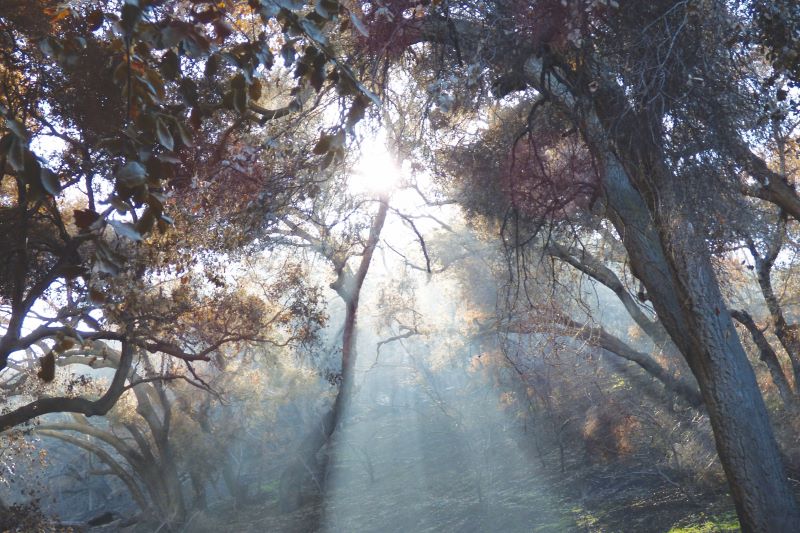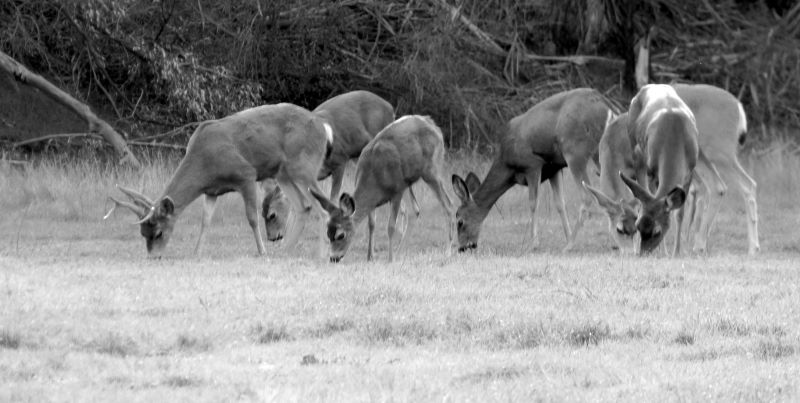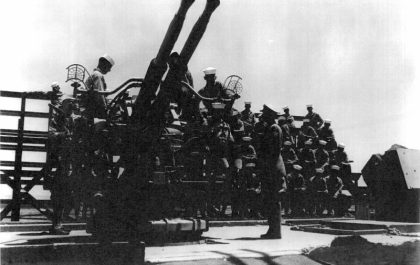
The fire burned for almost five days. The road remained closed. There was no way Jessie, Jacob or I could get to school, but we were kept busy at the ranch. Fire crews began straggling out of the backcountry, and there were sheriff’s deputies on patrol, electrical crews surveying the downed power lines, and even an inspector from the forestry office. Word spread that we had water, food and coffee. We became a sort of informal aid station. On that first day back we had a dozen firefighters camped out in the garden, and two tenders and a bulldozer parked in the driveway, and people kept coming. The men were exhausted. Some of them had been on their feet for days working to put the fire out with just shovels and pickaxes.
The sheriff’s deputies got word to the Red Cross ladies at the courthouse about our impromptu aid station, and the indefatigable Mrs Browning arrived with food and first aid supplies. There were a lot of injuries—burns, cuts, scrapes, sprains, rashes from poison oak, and even bee and wasp stings. She drafted Jessie to help her and another volunteer lady from the Red Cross and got to work patching people up.
Jacob and I did the chores, including putting out water and bales of hay for the deer.
“We’ll need to give our wild neighbors a little extra help until the rains come,” Aunt Maddie told us.
We also made sure our human guests had the things they needed, like soap and towels and blankets. I was kept busy serving food to the firefighters. The supplies the Red Cross ladies brought were welcome. Mrs Calzada was an amazing cook, but we were running out of almost everything except honey and things from the garden like oranges and chard, and those guys ate a lot—some of them hadn’t eaten anything for days. We went through all of the coffee and flour in the kitchen and the whole household’s sugar ration before Mrs Browning arrived.
From our visitors we learned that the fire had spread in a fan-shaped sweep of flames from a prison camp in Las Flores Canyon all the way to Paramount Ranch over the hills in Cornell, and to Malibu Creek. Everyone was saying it was started by an arsonist.
“How could anyone do that?” Jessie demanded. “Especially when the country is at war?”
We found out that Aunt Maddie’s old neighbor, the one who had been a silent movie actor and who lived on a ranch that had been surrounded by fire, was safe and that his ranch and his animals were, too, but not everyone was that fortunate. The elderly lady who lived in the house next to Jessie’s family had lost her home. At first glance, from the front at least, the house looked like it was OK, but that was only because the bricks on the front wall hadn’t burned. Inside, all that was left was the chimney and enough of the walls to keep the bricks from falling. The lady had gone to stay with her grown-up daughter in town. The sheriff put a saw horse in front of the driveway with a sign on it that said: “Danger, Keep Out.” I’d never thought about that house much. It was just there. Jessie and I walked by it every day on our way to catch the school bus but I’d never been in it, or said anything more to the lady who had lived there other than “hello” or “good morning”. It felt strange to see the blackened, empty shell, instead of a house where people lived. The weirdest part was that there were flowers blooming in the garden, as if nothing had happened.
Jessie’s father arrived on the third day with Mr Zelle. Jessie couldn’t wait to tell her father about our adventures, but he forestalled her with a newspaper. It had pictures of the fire and the evacuees. There was a good one of Jacob with the horses with a caption that said, “Jacob Quinn, 17, helps wrangle horses on the beach in Malibu, during the catastrophic October 20 fire that has burned more than 10,000 acres and displaced hundreds of residents and their animals.”
There was one of Mr Samov on a stretcher at the casualty station, too, and the story told all about how Jessie had splinted Mr Samov’s leg and how we had gotten him out of the canyon to safety in the wheelbarrow.
“How does it feel to be news instead of to write it?” her father asked, grinning at us. It was clear that he was proud of his daughter.
Jesse was delighted to see her father, and spent the afternoon with him checking out her own house—some of the trees in the garden had burned, and the house was full of ashes and smoke, but it hadn’t burned at all. When Mr Lawrence left to drive back into town, Jessie asked to stay with Aunt Maddie and us.
“They need me, Dad,” she told him, earnestly.
Mr Lawrence agreed, and promised to return the next day with more supplies.
I was awfully glad she was staying. Mr Zelle chose to stay, too, and just knowing he was safely back at home was a comfort. The first time I heard the sound of piano music from his cottage I felt like things were the way they should be again.
The fire burned 25,000 acres before it was finally under control. There were still fire crews around for days afterward, making sure every bit of fire was out. The cleanup from the fire continued long after the last of the firefighters packed up their gear and headed back into town. It was two weeks before we got our electricity back. The phone lines took a little longer, but at last they were working again, too.

It would be a long time before the landscape recovered. Everything was gray and brown and black, and the gritty ash got into and onto everything. We had to dust everything over and over again, and there was no way to remove the smell of old smoke and cinders. It was everywhere: in our clothes and hair, in our pillows and blankets. Even the beach smelled of old smoke instead of fresh air. and the ashes and grit washed up on the shore to make lacy black patterns on the sand.
After all of that fear and terror during the fire, Halloween seemed very tame that year, but one good thing happened because of the fire. My father wrote to me at last—a real letter. We had sent him a telegram as soon as we could to let him know I was OK, but it was the news story that got his attention.The fire made headlines across the county, even in Hawaii, and the story, complete with the picture of Jacob and the quote from Jessie, was printed in newspapers there, too.
Father wrote that he was proud of Jessie and me for helping Mr Samov. It showed I had “what it took to be a doctor.”
“If only,” I thought. What it showed was that Jessie had what it took to be a doctor, not me.
Father wrote that he was doing well. Soon he would be recovered enough to go back to work, but he would be staying in Hawaii and working at the military hospital where he had been recovering from rheumatic fever, instead of being assigned to another ship.
“It’s beautiful here, Jimmy, and I plan to stay when the war is over, God willing,” he wrote. “You’ll like it.”
Hawaii? I’d always known we wouldn’t be going back to Illinois and the little clapboard house at the Naval Base, but Hawaii? It was so far away. Would I like it? When I shut my eyes and thought about home, it was the ranch with its red-tile roof, and the animals, and Aunt Maddie, and my friends, and my piano, and my music.
When the war was over Kitty would come home again, but if I was in Hawaii I wouldn’t be here to be with her and Jessie. They would go to school together, pursue their dreams together, and I would be somewhere else, living someone else’s dream. I longed to see my father. I’d worried so much about him, and missed him so much, but I couldn’t picture a life with him in Hawaii. My sister Aly wouldn’t be there. We wouldn’t be the same family again, ever again, but I would still be expected to be that same person I was, the one who was supposed to follow in my father’s footsteps into medical school and be just like him. I was so glad to know at last that he was safe and getting better, but I had traded one worry for another. Instead of worrying about my father, I was worrying about my own future.




